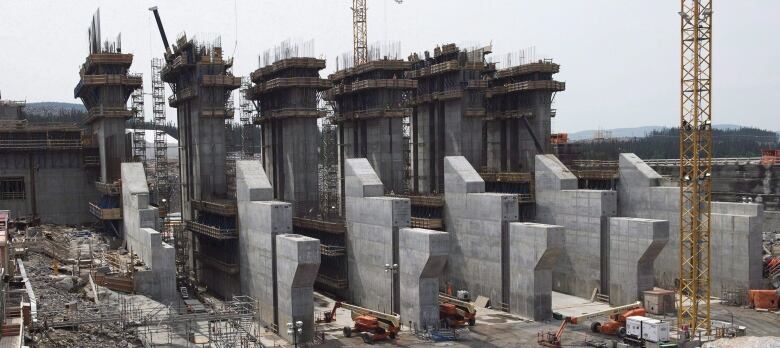It's official: Muskrat Falls a boondoggle, says Stan Marshall
Marshall says top priority to find ways to lower projected electricity rates over next four years
Nalcor Energy CEO Stan Marshall acknowledged Friday that the Muskrat Falls Project is a boondoggle and was not the right choice for Newfoundland and Labrador's energy needs.
The cost of theproject has ballooned to $11.4billion,including interest.
That's an increase of $4 billion with interest factored infrom when the project was first sanctioned in 2012.
"It was a gamble and it's gone against us," he told reporters at a briefing in St. John's his first since taking on the job in April.
- Stan Marshall, Nalcor's new CEO, 'deeply troubled' by Muskrat Falls
- Muskrat Falls another 10% over budget, cost climbs to $7.65B
Marshall saidfirst power from the Muskrat Falls generating stationwon't happen until 2019, reaching full power in the second quarter of 2020,nearly two years behind schedule.
He also pointed out power demand in the province will not grow at the ratepreviously estimated, which means higher power bills for consumers.
By 2022, the domestic rate for power is expected to jump to nearly 22 cents per kilowatt hour, almostdouble the current rate of 11.9 cents.
For the average homeowner,Nalcorestimates this could mean an extra $150 per month in power costs, before HST, which Marshall described as "not affordable."
"Muskrat Falls was not the right choice for the power needs of this province," he said.
We've already spent $6.7 billion, have to spend billions more to cancel, and have no power. Cancelling not an option #nlpoli
—@PeterCBC"I'm not at all surprised that the cost is where it is," said Marshall, adding "original estimates were low."
When asked what went wrong with the project, Marshall said its size is one factor.
"The generation and transmission project was much too large than was necessary to meet the energy requirements of the province," he said.
"The original capital cost analysis, estimates and schedule was very aggressive and overly optimistic and just didn't account for many of the risks that were known, or should've been known, at the time. And the analysis, finally, relied on high energy prices which were projected to continue with the rise."
Lack of experience a factor, says Marshall
Another part of the problem was a lack of experienceby Nalcor and its contractors workingin a cold, northern climate, Marshall said, adding that Nalcor has not built a power project in a very long time.
He said his job over the next four years is to find savings or boost revenue. For example, he isasking for a larger loan guarantee from the federal government to reduce borrowing costs.
Stopping the project is not a practical option.- Stan Marshall
"We have fouryears in order to address the rate. Alot of things can be done in fouryears that can't be done in the two months I've had so far. So I'm going to step back and think," Marshall said.
"We will focus on getting more value from the excess power and exploring new arrangements and longer term arrangements to secure as much additional revenue as we can."
He said the key to this will be talks with Emera and Hydro Quebec.
"My challenge is to ensure that come 2021, our electricity rates will be substantiallyless than I've just described," said Marshall.
Astaldi dispute still ongoing
Meanwhile, the single biggest uncertainty about costs going forward, according to Marshall, is a "major" dispute with Astaldi, the Italian company contracted to build the power generating station at Muskrat Falls.
Alot of things can be done in fouryears that can't be done in the two months I've had so far.- Stan Marshall
Both sides are at odds, with Astaldi demanding hundreds of millions in additional payments from Nalcor.
Marshall said there has been very little progress in talks with the company, though an eventual resolution has been factored into thenew estimates for the project.
"I put in an estimate. They do not reflect theworstcase or the best case," he said, adding there is no deadline to reach an agreement.
Too late to cancel

Nalcor has spent, or is contractually obligated to spend, more than $6.7 billion on the Muskrat Fallsproject.
Marshall said it's simply gone too far to pull the plug.
"If we halted this project, we would have spent $6.7 billion, and would have to spend billions more to settle claims and bring the project to some conclusion," he said.
"And we would not have a source of power, which is needed."
What's more, Nalcor is contractually obligated to provide Emerawith free power for the next 35 years.
Emerais building the Martime Link, which will bring Muskrat Falls power to mainland Canada.
"Stopping the project is not a practical option," Marshall said.
Link to be completed next year
Meanwhile, the Martime Link project remains on schedule and on budget,with completion scheduled for late 2017, according to a statement Friday from Nova Scotia'sDepartment ofEnergy.
The project includes constructing a transmission line from central Newfoundland to the province's southwest coast, and under the Cabot Strait to Nova Scotia.
The link will be owned and operated by Emera for 35 years, though Nalcor will have transmission rights to import and export power over the 50 megawatt capacity line.
In exchange for building the link, Emera will receive 20 per cent of the electricity generated at Muskrat Falls.
The department released a statement, saying there is a plan in place to deliverrate stability to Nova Scotia power consumersfor the next three years.
"We don't see today's update changing our plan. The Maritime Link project is also important for our plan to reduce greenhouse gas emissions and reach our target of 40 per cent renewable energy by 2020.
"This announcement doesn't impact our ability to meet our target."













_(720p).jpg)


 OFFICIAL HD MUSIC VIDEO.jpg)
.jpg)



























































































